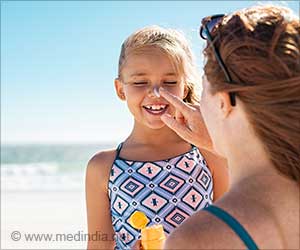Further Details: All sunscreens, including those labeled as “water resistant,” will eventually wash off. Claims of water resistance for 40 or 80 minutes indicate the duration of SPF-level protection in and out of water. The labeled SPF-level protection lasts for that specific amount of time. Manufacturers are not permitted to assert that their sunscreens are “waterproof” or “sweatproof.”
Advertisement
Myth 2: Sunscreen causes cancer.
Fact: There is no medical proof supporting the notion that sunscreen leads to cancer.
Further Details: UV rays from the sun and tanning beds can cause cancer, as proven by medical evidence. Some people worry that the chemicals in sunscreens can be absorbed by the skin and possibly cause cancer.
Myth 3: I have dark skin. I don’t need to wear sunscreen.
Fact: Dark skin is equally vulnerable to sun damage.
Further Details: It’s just harder to see sun damage on dark skin. When exposed to UV rays, skin cells release pigment, which we recognize as a sunburn. This pigment is less noticeable in darker skin tones. Your skin color is not the same as SPF sun protection.
No matter your skin color, put on sunscreen 30 minutes before going in the sun and reapply often.
Myth 4: My sunscreen is SPF 50 so I don’t need to apply it as often.
Fact: Regardless of the SPF number, sunscreen typically remains effective for about two hours.
Further Details: The number refers to how much protection you’re getting from the sunscreen, but not how long it lasts. Therefore, it’s crucial to reapply sunscreen every two hours, even if you’re using one with a high SPF like 50.
Myth 5: I don’t need sunscreen if it’s cloudy or cold.
Fact: Clouds are simply water vapor. They can’t protect you from UV rays. Therefore, even on cloudy or cold days, you should apply sunscreen just as you would on a warm, sunny day.
Further Details: Skipping sunscreen when engaging in activities like skiing or being out in the snow. But they still get sunlight, both from the sun itself and from the snow’s reflection. The same thing happens on cloudy beach days. You can get sun exposure from the sun’s rays and also from their reflection on the water or sand.
Myth 6: Infants under the age of 6 months can apply sunscreen.
Fact: Sunscreen is not recommended for infants under 6 months of age.
Further Details: Infants are more susceptible than adults to sunscreen side effects, such as a rash. The FDA advises keeping infants out of the sun between 10 a.m. and 2 p.m. and using protective clothing, such as lightweight long pants, long-sleeve shirts, and brimmed hats that shade the neck, if they need to be in the sun. Consult a doctor before applying sunscreen to children under 6 months.
To conclude, understanding the facts about sunscreen is crucial in safeguarding your skin from the harmful effects of sun exposure. Skin cancer, a prevalent concern in the United States and worldwide, can often be prevented with the right precautions.
Precautionary Measures Against Sun and UV Exposure
-
Opt for a broad-spectrum sunscreen with an SPF of at least 30, as recommended by the Food and Drug Administration - This ensures protection against both UVA and UVB rays. Wear long-sleeved shirts, long pants, and wide-brimmed straw hats with holes along with sunscreen for extra protection
- Remember to shield your lips with an SPF-containing lip balm. Avoid tanning beds, as they expose your skin to excessive UV radiation, which can lead to dry skin and other complications. Stay informed about sunscreen guidelines through resources like the Federal Register, as the federal government continually updates recommendations to promote skin health
- Using sunscreen and sunblock protects your skin from the sun’s harmful effects when you’re outside
- Don’t forget that clothing and sunglasses can protect your skin from UV rays
Disclaimer: If you have any questions about sun protection, consulting your doctor can provide valuable advice to help lower your risk of skin cancer.
Reference :
- Facts about Sunscreen – (https://www.fda.gov/news-events/rumor-control/facts-about-sunscreen)
Source: Medindia



